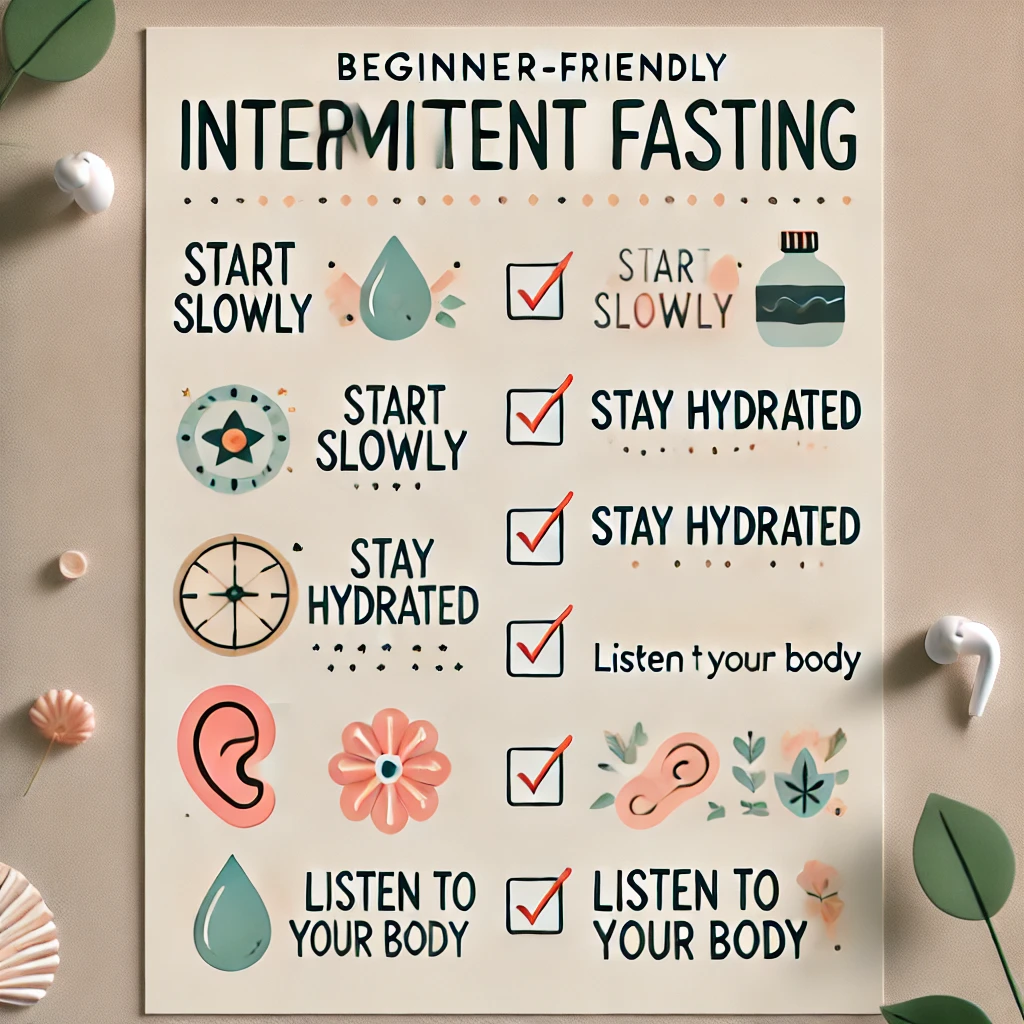
Introduction
Intermittent fasting (IF) has taken the wellness world by storm. With benefits ranging from weight loss to improved metabolic health, it’s no wonder so many people are interested in giving it a try. But what exactly is intermittent fasting, and how does it work? In this guide, we’ll walk you through the basics, benefits, and methods of intermittent fasting, along with some beginner-friendly tips to help you succeed.
Whether you’re aiming for weight loss or a healthier lifestyle, this guide is designed to give you everything you need to know about intermittent fasting. So, let’s dive in!

What is Intermittent Fasting?
Intermittent fasting is an eating pattern that alternates between periods of eating and fasting. Unlike most diets, intermittent fasting doesn’t prescribe specific foods to eat; rather, it focuses on when to eat. This unique approach has made it popular among people looking for a flexible lifestyle change rather than a restrictive diet.

There are several types of intermittent fasting schedules, including:
- 16:8 Method: Fasting for 16 hours and eating within an 8-hour window.
- 5:2 Diet: Eating normally for five days a week, and then limiting calories to 500-600 on two non-consecutive days.
- 24-Hour Fast (Eat-Stop-Eat): Fasting for 24 hours once or twice a week.
Each method has its own unique structure and can be chosen based on personal preference and lifestyle.
How Does Intermittent Fasting Work?
The science behind intermittent fasting is based on your body’s metabolic response to fasting periods. During fasting, your body has time to lower insulin levels and burn stored fat, while promoting cellular repair. Here’s a closer look at the main processes:

- Insulin Reduction: When you fast, insulin levels drop, which encourages the body to burn stored fat for energy.
- Cellular Repair: Fasting triggers autophagy, a process where cells remove damaged components and recycle materials, supporting cellular health.
- Fat Burning: Once the body uses up available glucose, it switches to burning fat, making intermittent fasting effective for weight loss.
Studies show that intermittent fasting can improve insulin sensitivity, support weight loss, and may even have anti-aging benefits.

Intermittent Fasting Benefits: Why People Love It
Intermittent fasting offers a range of benefits, making it a popular choice for those looking to improve health or lose weight:

- Weight Loss: By reducing the eating window, it’s easier to maintain a calorie deficit, which can lead to weight loss.
- Metabolic Health: Studies show that intermittent fasting can improve insulin sensitivity and help lower blood sugar levels, potentially reducing the risk of type 2 diabetes.
- Mental Clarity and Focus: Fasting increases the production of brain-boosting ketones, which can improve mental clarity and focus.
- Longevity: Animal studies suggest that intermittent fasting may increase lifespan by promoting cellular repair and reducing inflammation.
These benefits, combined with the simplicity of an eating schedule rather than a traditional “diet,” make intermittent fasting a flexible and appealing choice.
Getting Started with Intermittent Fasting: Tips for Beginners
Starting intermittent fasting may feel challenging, especially if you’re used to regular meals throughout the day. Here are some practical tips to ease into it:
- Start Slowly: Don’t jump into a 16-hour fast on day one. Begin by extending the time between dinner and breakfast by an hour each day until you reach your desired fasting period.
- Stay Hydrated: Drinking water throughout the day can help control hunger and prevent dehydration. Herbal tea and black coffee (without sugar or cream) are also good fasting-friendly options.
- Plan Balanced Meals: Make the most of your eating windows with nutrient-dense meals that include lean proteins, healthy fats, and plenty of fiber. This will help you feel fuller for longer.
- Listen to Your Body: Intermittent fasting shouldn’t be uncomfortable. If you feel dizzy or extremely hungry, adjust your fasting period to suit your comfort level.
- Be Consistent: Like any lifestyle change, consistency is key. Set a fasting schedule that you can stick to, even on weekends, for better results.

Frequently Asked Questions about Intermittent Fasting
Can I drink coffee during fasting?
Yes, black coffee is generally allowed, as it has almost no calories and can help suppress appetite.
Will I lose muscle mass while fasting?
With proper nutrition during eating windows and incorporating strength training, you’re unlikely to lose muscle mass.
How soon will I see results?
Results vary by individual, but many people report initial changes within a few weeks. Consistency is key.
Is Intermittent Fasting Right for You?
Intermittent fasting can be a powerful tool for weight loss, improved health, and even mental clarity. However, it’s important to listen to your body and choose an intermittent fasting method that aligns with your lifestyle. If you have any medical conditions, consult a healthcare professional before starting. Remember, the best diet is one you can stick to long-term!




Leave a Reply